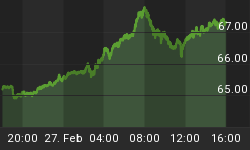So far, 2006 has been a very volatile year for gold stocks. After soaring 20% in January, the XAU declined by 15% in February, despite the fact that gold only declined 1% during the month. Many analysts have interpreted this "weakness" as being bearish for the metal itself. No doubt if gold makes a new high, unconfirmed by the XAU, those same analysts will claim the divergence signifies yet another top.
However, those of us who have been long mining shares for the entire move realize that this leg up has been characterized by the metal leading the shares. While it is widely believed that mining shares are a leading indicator for the metal, these shares are more commonly owned by speculators than is the physical metal. Thus, the restraint shown by speculators reflects a healthy degree of skepticism with respect to gold prices. As a result, the market climbs a classic "wall of worry" as speculators, nervous about gold prices falling, are reluctant to bid mining shares too high. Then, the subsequent divergence is seen as further evidence of a potential top in the gold market, making the "wall of worry" that much more difficult to climb.
This current market in gold reminds me of the course taken by oil and oil shares during the three year period between June of 2001 and June of 2004. During that time, despite oil prices having doubled, the Philadelphia Oil Services Index (OSX) barely budged. The high degree of skepticism that existed regarding the legitimacy of oil's new bull market was able to keep share prices in check. (In fact, the wide-spread belief that oil prices were about to collapse allowed the Government and Wall Street to convince a gullible public to exclude energy prices from the CPI.)
It wasn't until skeptics accepted that higher oil prices were permanent that oil stock prices finally began to rise. Similarly, it took a while for the oil company executives themselves to come to the same conclusion, resulting in an increased willingness to plow higher profits into increased exploration and development. The result was increased earnings in the oil services sector and higher share prices.
In retrospect, the sluggish move in oil stocks proved to be a false indicator. Rather, the divergence merely demonstrated just how wrong stock investors had been with respect to their forecasts on commodity prices. I am convinced that the same will hold true with respect to gold. The recent weakness in the shares despite the underlying strength in the metals themselves merely indicates just how few investors actually understand the dynamics driving the gold market or just how high gold prices are likely to rise.
Rather than looking to what mining share speculators think might happen to metals prices in the future, look at what is actually happening today. With gold prices once again approaching $570 and silver prices above $10 per ounce for the first time in twenty-two years, it is clear that real money is moving into precious metals, and that it will be there for the duration. With central bankers around the world printing a lot faster than producers are mining, the flows will only intensify. Got gold?
In case you do not, visit www.goldyoucanfold.com to discover the best way to buy it. While you're at it, download my free research report on protecting your wealth through foreign equities available at www.researchreportone.com and subscribe to my free, on-line investment newsletter at http://www.europac.net/newsletter/newsletter.asp















